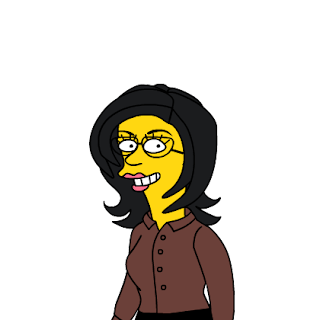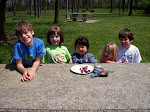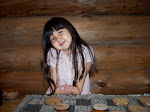Ever since bringing home our oldest daughter, people have raved to me about the "Everybody Counts" Curriculum used to "teach inclusion" in the public schools. While I've never really had any significant experience with the curriculum (I've read through their website and talked with parents whose children have been taught from it), there are several things that jump out to me as problems. I know. I'm so annoying. It just doesn't stop with me. Ask my husband.
To understand my perspective on this, you have to understand my vision of inclusion. My vision for inclusion is that my children's handicaps are nothing more than a tiny little blip on the radar screen of life. I don't want empathy for my children. Sensitivity, yes. Compassion, maybe if they get hurt or someone wrongs them. Pity? Never. I want healthy relationships and respect. Their disabilities are one facet of their lives, not the focus and certainly not what their life will be organized around. Are they life changing? Yes, of course, but that doesn't mean they need to be life defining.
From what I've read and have been told, the crux of the "Everybody Counts" curriculum is a smattering of simulation exercises. In other words, a child is blind folded and given a cane to simulate what a blind person experiences, or a child has an arm tied behind their back to simulate the experience of living with one arm, or a child is given a wheelchair to use for a specific period of time. The idea is that this will give the child an idea of what it is to live with such a disability.
Therein lies the problem.
If I go for a day using only my left hand, I am not able to accomplish even a fraction of what my oldest daughter does every day. In fact, I often do make myself do things one-handed so that I can advise her on how to accomplish certain tasks. However, it never fails. She finds a better, more efficient way. There is no way that my simulation comes anywhere near what the reality of living with one arm is like! These simulation exercises simply do not present an accurate picture of how a person lives with a disability.
Take, for example, the idea of blind folding a child to simulate living with a visual impairment. Do they really think a blind-folded kid with a cane has developed adaptive behavior necessary to accomplish ordinary life like a person who has been visually impaired since birth? Of course not, the only certain product it would create is the wrong attitude, an attitude of "it's so hard to have a disability!" or an attitude of "you're so amazing! You can dress yourself!"
It reminds me of the time not long after we adopted our first daughter, that a very nice lady I know couldn't stop going on and on about how impressed she was that our daughter could take herself to the bathroom.
"I mean she just hopped right up there and went and then wiped and then flushed and then hopped off and pulled her pants right up."
"That would be the general sequence of things..." I replied.
"Yes, but she did it so well."
"Yes, but she is 4 years old." I responded."4-year-olds use the toliet."
"Yes, but she's disabled."
Could've fooled me, I thought.
I mean maybe it was just me, but I was far more impressed with her incredible language skills (speaking complete English sentences only a couple months after arriving home!), her great imagination, and her cute little face.
I realize that I'm harsh on this, but, again, I take this all from the perspective of how I would want to be spoken of and to if I had a physical disability. I also know what I want my kids to be known for, and the simple tasks of everyday living are not on that list. Simulation exercises are dangerous in that they trick people into thinking that they have an understanding about something, but, in reality, they have gained a misunderstanding.
There are some other subtle attitudes that I don't like as well. These things are minor, like on the website where it says, "how people who are visually impaired cope with everyday life". I don't know how any parent of a visually impaired child would feel about it, or how a visually impaired person would feel, but I do know that my children don't "cope with everyday life", the "live" everyday life. It's a subtle difference, a mincing of words, but I believe it's important.
I understand that things need to be "hands on" with children. When I speak to groups of children about disabilities, I always make a point of having a hands-on exercise. For instance, I'll take a piece of paper and marker and tell three different kids to find three different ways to write their names without using their hands. Then, we don't discuss the difficulty of writing without hands, we talk about how there is more than one way to write. We talk about how they would improve at writing in their unique way over time, just as a child that writes with their hands improves over time. We talk about how having a physical disability means thinking outside the box. You have to think differently when you have unusual limitations placed on you. It's not harder, it's not sad, and it doesn't have to be limiting. It's just different.
I know I'm whining, but I just get really really tired of people admiring my kids for the wrong reasons. Their life is sweet and good. Their lives are full. There's really no room for pity. They just want to be viewed as regular old kids that have to accomplish some things in a different way. And, different can be really really good.
Saturday, February 16, 2008
No Matter What You Do, You Just Can't Be My Daughter
Posted by
Deb
at
3:09 PM
![]()
Labels: children, disabilities, everybody counts, schools
Subscribe to:
Post Comments (Atom)






2 comments:
Deb. Loved this opinion! It reminds me of the opening of "Little People Big World" the husband and wife say, "We just want people to know we can do all the same things, just in a different way." That's how our Brynley does things, all the same things, just in a slightly different way at times. Thanks for the reminder.
Darcy
Thanks Darcy!
I think it will take a long time before lots of people understand. However, I think people will get it the more they see great examples.
Post a Comment